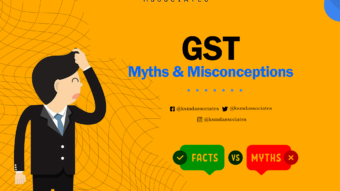The Goods and Services Tax (GST) is a major tax reform in India The Goods and Services Tax (GST) is a single indirect tax that has replaced a number of cascading taxes in India that has been implemented since July 2017. The GST has subsumed most of the indirect taxes that were levied by the central and state governments, and it has simplified the tax compliance process for businesses.
However, there are still some common myths and misconceptions about GST that businesses and consumers may have. In this blog post, we will debunk some of the most common GST myths and misconceptions.
Myth 1: GST is a New Tax
This is a myth. The GST is not a new tax. It is a combination of several indirect taxes that were already being levied by the central and state governments. The GST has simply simplified the tax compliance process and made it more efficient.
Myth 2: GST Will Increase Prices
GST will increase the prices of goods and services.
Fact: GST is unlikely to increase the prices of goods and services in the long run. In the short term, there may be some price increases as businesses adjust to the new tax system. However, these price increases are likely to be offset by the benefits of GST, such as reduced compliance costs and increased efficiency.
This is not necessarily true. The GST may lead to some increase in prices, but it is also likely to lead to some decrease in prices. This is because the GST will eliminate cascading taxes, which means that businesses will not have to pay taxes on taxes.
Myth 3: GST will only benefit large businesses
Fact: GST will benefit businesses of all sizes. Large businesses will benefit from reduced compliance costs and increased efficiency. Small businesses will benefit from the simplified tax system and the increased demand for their products and services.
Myth 4: GST is not applicable to MSMEs
Fact: GST is applicable to all businesses, including MSMEs. However, there are some special provisions for MSMEs, such as lower registration thresholds and simplified compliance requirements.
Myth 5: GST is only for businesses
This is also a myth. The GST applies to both businesses and consumers. Businesses will be required to register for GST if their turnover exceeds a certain threshold. Consumers will be required to pay GST on goods and services that they purchase.
Myth6: GST is complicated.*
This is another myth. The GST is actually quite simple. The tax rates are clearly defined, and the compliance process is straightforward. Businesses can avail of the help of GST consultants to help them understand and comply with the GST laws.
Fact: GST is actually a relatively simple tax system. It is based on the principle of destination-based taxation, which means that the tax is paid where the goods or services are consumed. This makes GST much simpler than the previous system of cascading taxes, which were based on the principle of origin-based taxation.
Myth 7: GST will kill small businesses
This is not true. The GST is actually expected to benefit small businesses. This is because the GST will simplify the tax compliance process and make it more efficient for small businesses.
Myth 8: GST will be a burden for consumers
Fact: GST is unlikely to be a burden for consumers. In the short term, there may be some price increases for certain goods and services. However, these price increases are likely to be offset by the benefits of GST, such as increased competition and lower prices for other goods and services.
GET EXPERT ADVICE
With Expert Guidance
document.getElementById( "ak_js_1" ).setAttribute( "value", ( new Date() ).getTime() );
Conclusion
GST is a relatively new tax system, and there is still some confusion about how it works. However, the myths and misconceptions about GST are often exaggerated. GST is a simple tax system that will benefit businesses and consumers alike.
These are just some of the most common GST myths and misconceptions. It is important to be aware of these myths so that you can make informed decisions about GST. If you have any questions about GST, you should consult with a GST consultant.
If you have any questions about GST, please consult a tax expert. You can also visit the GST website for more information.
Additional Resources:
- Government of India GST website: https://www.gst.gov.in/
- GST Council website: https://www.gstcouncil.gov.in/
- GST helpline: 1800 425 6666


Add a Comment